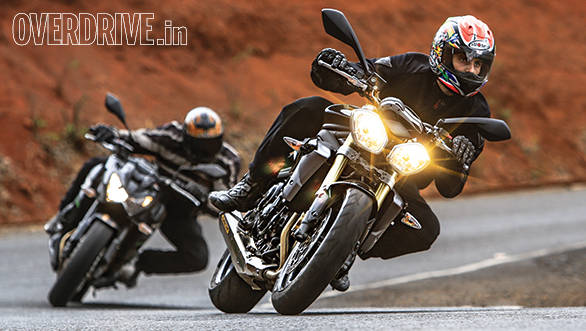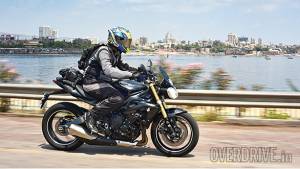The nature of motorcycles and how we react to them
After I went to town with giddy happiness at the arrival of Ferine, my Street Triple, I got a number of emails, PMs, DMs etc with one question in them. "Why did you pick the Triumph over the Kawasaki Z800, which is obviously far better value - it gets one more cylinder as well as more power?". It's a good question.

Once the Triumph power output faux pas came to light, we revisited our Z800-Striple comparison and re-evaluated our conclusions. I ended up changing the verdict. The drop in reported power does not make the Street Triple a worse motorcycle than before but it certainly makes it inferior value for your money. Three-odd months later I went and paid most of my savings for a motorcycle I myself declared was not very good value. How can I resolve this issue where I'm clearly saying one thing and doing another? I believe the answer has to do with the nature of motorcycles, how we react to them and the impact both of those things have on road testing them and writing conclusive verdicts.
I believe a road test has a basic level that underpins it. Half that layer is verification. Where you set out to see if the manufacturer's specification is realistic or just a fanciful claim. Manufacturers do game this but very slightly. The acceleration figure, for instance, is usually delivered by the lightest trim/variant in the hands of a tiny test rider. Economy is a tougher proposition. We try to standardise the real world as much as possible to make the figures comparable. But are they accurate? Yes, if you drive exactly like us, in the conditions we test in. Drive harder or slower, in traffic or out of it, forget to check tyre pressures regularly and the economy you'll see changes. Power outputs are even harder to verify because India still isn't performance oriented enough to have commercial dynos available easily. When this changes, I expect to be dyno-ing test vehicles too. The other half of basic testing is the essentials of reporting how aggregates feel and work. "Clutch feel is progressive and shifts are slick..."
Unfortunately, a road test that does just this, does injustice to motorcycles. Motorcycle road tests today owe a lot to how car road tests are conducted. This is especially true if the organ in question has a heavy handed car-bias. That's a problem. Cars are a vastly less emotional purchase and hence, the focus on function has to be greater to reflect the purchase decision.
In India, we do actually have a class of buyers who buy bikes like cars - it's all function when it comes to judging value for money. Thankfully, these people, by and large, do not read automotive magazines.
The people who buy motorcycles and read us tend to be hunting for a lot more than functional efficiency. They're in love with bikes. They want an emotional spark that will bind them to their new motorcycle. Positive shifts and a progressive clutch are a small part it and probably not vital. Writing road tests for these readers is complex and it is a challenge that I love.
The nuance about emotion, of course, is that it is subjective. Strong emotions a KTM 390 Duke raised led me to a purchase. But one reader wrote a passionate defence for the Honda CBR250R. That's the beauty of motorcycles. What he was saying really was simple - the Honda ticked more boxes for him than the KTM and it made his heart beat harder so he was going to get himself one.
That's the truth about motorcycle road tests. If you identify with me as a rider and as a person, then chances are that if you go with my recommendations, you will like the bike - assuming I'm good at my job. In this sense, Rishaad, Alan and Halley are all different people and their flavour of motorcycling will differ. But read a motorcycle road test and believe it as gospel and you could be headed for trouble. Some motorcycles are better at accommodating your emotional needs than others - Hondas are usually targetted at as wide an audience as possible and the Japanese company really knows what secret sauce makes this work. But when you have a bike that takes a stand - for instance by aiming for a specific role - then you need to be more careful about how you interpret a road test.
It's emotion that led me to the Triumph shop and not the Kawasaki. My purchase wasn't about an extra cylinder or more power or indeed more value for money. Both the Z800 and the Street Triple are impressive motorcycles and I say again, the Z800, is better value. But the Z800 felt too calm, too civil for my taste. I can identify people who'd be happy with it. But I am not one of those people. I wanted a motorcycle that was angrier. The Triumph was lighter, more responsive and it felt like it could be modded and prodded into a far angrier state - the way I like my motorcycles. In fact, if you see the mods Ferine has been receiving, you'll see the direction my bike's headed in.
Moral of the story? It's nice to boast about numbers. To say that your motorcycle is so many seconds faster to such and such speed than someone else's. But that's the superficial part of your attachment to your motorcycle. The deeper feelings - I still feel a great swell of joy when I see and ride Ferocitas - are what you should focus on. They determine how much you'll enjoy a particular motorcycle and they're hard to quantify and articulate but they're as real and tangible as the motorcycle itself. These feelings are intensely personal and you should pay attention to them. Because they're exactly like motorcycles - intensely personal.
Click here for more opinion pieces by Shubhabrata Marmar.
Click here to see how Ferine is doing.







